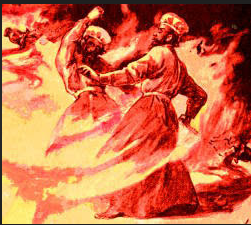The Biblical Doctrine of
Possibilities, Choices,
and Outcomes
by Mark Mountjoy
Can we find elements of Open Theism in God's actions regarding the deliverance of the Israelites, followed by subsequent disappointments? Out of the multitude, only two individuals who crossed the Red Sea were permitted to enter the Promised Land: Joshua and Caleb. If God had predetermined that only two men would enter the Promised Land, why did he not allow only those two to pass through the Red Sea and kill all the rest? This is an interesting question to pursue, as it touches on fundamental issues of divine foreknowledge, human free will, and the nature of God's interaction with humanity.
The drastic attrition rate between the multitude of Israelites delivered from Egypt and the mere two who finally entered the Promised Land 40 years later presents a logical dilemma from some theological perspectives. Traditional Calvinistic predestination struggles to explain why God would orchestrate such a massive exodus if He had already determined that nearly all participants would fail ten tests. Similarly, classical Arminian theology, while emphasizing human free will, must grapple with the scope of divine foreknowledge in this scenario for similar reasons.
From an Openness viewpoint, this could be seen as evidence that God did not predestine every detail, but rather the Israelites' consistent disobedience, lack of trust in God, and stubbornness necessitated severe responses rooted in genuine nescience perched on the fulcrum of an uncertainty principle. Their rebellion resulted in unintended long-term consequences. The narrative suggests a genuine divine disappointment and frustration with human perceptions, emotions and choices that would seem incompatible with a completely settled future.
The episodes of rebellion are particularly telling. The golden calf incident, the response to the spies' report, and various instances of grumbling and rebellion each appear to provoke genuine divine anger and grief that seem to come from a place that better alternatives were clearly unwanted and avoided. These reactions seem more consistent with a God who experiences real relationship with His people than with a deity merely acting out predetermined responses.
An Open Theist interpretation could argue:

(2) The miraculous nature of the exodus suggests God's investment in the real possibility of their jouney's success. God was genuinely grieved by and angered at the Israelites' recurring distrust and disobedience. This would not be logically coherent if every detail was already foreordained. The intensity and frequency of divine emotional responses throughout the wilderness narrative suggest real disappointment with freely made human choices.
(3) The consequences enacted upon that generation, including swallowing Core, Dotham and Abiram alive into the heart of the earth, infliction of a pandamic that felled multiple thousands, and barring the majority of survors from entering Canaan, were responsive punishments rather than predetermined outcomes. Only Caleb and Joshua were spared due to their proven faithfulness.
This suggests divine judgment based on actual choices rather than pre-scripted events. The forty-year wilderness period appears more as a divine adaptation to human failure than a pre-planned disingenuous scenario. This extended period served to raise up a new generation, suggesting God's ability to work with human choices to still accomplish His purposes.
So in the Open Theist paradigm, God reacts genuinely and dynamically to people's choices. The Israelites' rebellion necessitated severe discipline, resulting in unintended generational loss and through it all only Caleb and Joshua proved worthy to receive the promise. This situation could be viewed as the unintended results of human decisions rather than unilateral divine predetermination from the outset.
This interpretation maintains both divine sovereignty and meaningful human responsibility while providing a coherent framework for understanding the dramatic reduction from a delivered multitude to just two individuals entering the Promised Land. It suggests that God's purposes can be accomplished through dynamic interaction with human choices rather than through rigid predetermination of all events.
Related
Does the Bible Teach Arbitrary
God, Open Theism, and the
Uncertainty Principle in Biblical Narratives
Caption: Nadab and Abihu offered strange fire to Yahweh and he burnt both men to cinders. (Leviticus 10:1-5)
